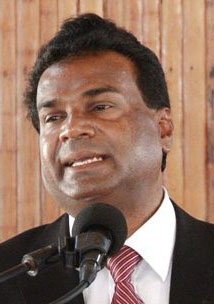Despite receiving only just over a third of the information requested from nine government agencies, the Guyana Extractive Indus-tries Transparency Initiative (GYEITI) is optimistic it will be able to receive all the data by the end of the year, its head Dr. Rudy Jadoopat says.
Speaking to Stabroek News at the GYEITI’s new office on Main Street, Jadoopat emphasised that the country’s first report on the governance of the extractive industry has to be submitted by April next year to the global Extractive Industries Trans-parency Initiative (EITI). This is part of the
process for full accession to the EITI.
“As a result, we hired an Independent Administrator (IA) – Moore Stevens LLP – who came here in October and they met with the government agencies and companies. They had about 20 meetings and told them what is expected and they gave them a list of documents that are required,” he said.
He had previously said that the draft report was expected to be completed by the end of November.
Compliance with the global EITI standard requires the disclosure of information along the extractive industry value chain from the point of extraction to how revenues progress through the government and and how they benefit the public.
Jadoopat noted that a list of 83 items was requested of nine government agencies – the Guyana Revenue Authority (GRA), the Guyana Geology and Mines Commission (GGMC) Mines Division, GGMC Petroleum Division, the National Insurance Scheme (NIS), the Bureau of Statistics, the Guyana Gold Board, the Department of Fisheries of the Ministry of Agriculture, the Guyana Forestry Com-mission (GFC) and the Environmental Protection Agency (EPA). Each agency was required to submit different information and according to Jadoopat, so far, only 34% or 28 of the items requested have been submitted by the respective agencies, with the GGB being the most compliant.
However, he explained that while some of the agencies might not have complied with the request for information, they would’ve submitted other general information.
“For example, you have the GGMC receiving rental fees, royalties and the Gold Board collects sometimes from the miners who also sell to the gold dealers that go back to the Gold Board. So you can get the total from GGMC but not the names of the persons, the details. While we have the aggregated number, we have no specific details,” he pointed out.
He said that the specific details as it pertains to payments for companies and persons working in the extractive industry will allow the Independent Administrator to determine a threshold by which companies that will need to submit information for the report will be selected.
However, he noted that currently they are being blocked by the law, which restricts GRA from declaring specific information.
Tax information
“This happens in a lot of countries. The laws do not allow for personal tax information to be given out to the public. However, when you deal with natural resources, which belong to all the people of the country and you are making money from extracting resources, the people must know. It is not your salary that you earn, it is what you get from the resources that belong to the people,” he said, while explaining that a section of the Income Tax Act prevents GRA from disclosing such information.
However, he said the same Act provides for the clause to be overridden with the consent of the authority or the person authorised by the President of the country.
“GRA have submitted other information but none of the three that are requested that is required for the report,” he added, while stating that the GYEITI Multi-Stakeholder Group (MSG) has to meet to discuss the way forward as it relates to the restriction of information from GRA.
He added that the Minister of Natural Resources Raphael Trotman is aware of the obstacle.
However, despite the result so far, Jadoopat said he is confident that the agencies will submit the requisite data by the end of the year, which will kick-start the final processes before the report is drafted and then finalised.
“It’s not really slowing down the process. It can if it goes on and on but I do not predict that happening. If the government is going to fulfil its commitment to the EITI, the transparency process which it signed onto, then it has to direct the government agencies to submit the relevant data,” he said.
“Let’s say we receive everything, the IA will prepare the reporting templates, a form and send it to the MSG to approve it and then a workshop will be held with all the companies that fall into the threshold and government agencies who will then be given a deadline. And hopefully, by the end of January we can complete the templates… And then after that we will have the first initial draft by February,” Jadoopat added.
When questioned as to whether he feels the agencies understand the importance of submitting the requested information, Jadoopat said yes but to the extent the law allows them.
“As it relates to GRA, I spoke to Mr. [Godfrey] Statia [the Commissioner-General] himself and he says he doesn’t have a problem giving the information, he just doesn’t want to break the law and this only happened a couple of days ago. So the MSG [Multi-Stakeholders Group] has to meet and discuss it,” he said.
He also related that the agencies might be taking a long time to submit the information since they would be not be computerised and organised and they would have to sort through documents to find them before compiling and submitting. However, he noted that he would prefer if they can be submitted by the middle of December so as to not slow down the entire process.
He added that he has since written letters to the agencies, requesting that they submit the additional information in order for them to be able to proceed with the preparation of the report.






